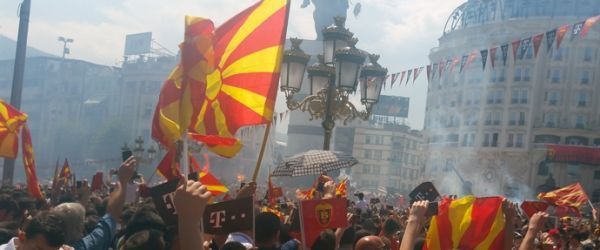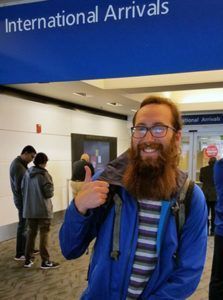
Using video games to share the gospel
If cross-cultural ministry was a video game, you could say that Engage Macedonia took Andrew Bigos to the next level.
Andrew knows his goal for this game: Develop relationships within the cross-cultural gaming community in order to share Christ and make disciples.
He already passed Level 1: A short-term trip to Kenya, during which he felt God calling him to share the gospel with the unreached
In Level 2, Andrew lived in a missional community in Detroit and worked on a master’s degree in Spiritual Formation and Discipleship.
He racked up the points in Level 3, when he chose to serve with SEND — which pushed him on to Level 4: Choosing a field.

He thought Poland was Level 5, until he took a trip to a country he’d never even heard of …
Q. How did you spend your summer?
I was one of five interns with Engage Macedonia. We worked with refugees, taught English, worked with a local church, did sports ministry, ran a children’s camp in a Muslim area, and learned Macedonian. And, on top of all that, we got to do our own kinds of ministry, too.
Q. What did you appreciate about Engage Macedonia?
I liked that it wasn’t just “here’s your schedule” or “you’re completely free to do whatever you want.” It was kind of in between.
Q. When you could do whatever you wanted, what did you do?
I went and found gamers and hung out with them. Macedonians are really open. They’ll talk about anything. We’d be having a normal conversation about gaming, and when they found out I was religious, the conversation would turn.
The missionaries encouraged us: Go out, talk to people, get their numbers. It’s not culturally weird. So we went to a juice bar, and the guy working there knew English from playing video games. So, I called him up, and we hung out a few times — including coffee at 11 p.m. He hits me with this question, right away: “So, how do I get an American girlfriend?” He told me his whole life story. I was able to tell him, “I can see you’re trying to fill your life with women, but you should fill your life with Jesus.” It was cool to be able to connect in that way, initially over games, but then getting into more personal areas.
Q. You’ve been on some other short-term trips. How was Engage Macedonia different?
The SEND Macedonia team was really into discipleship and building into you. I had a friend who went to Africa and had a cool missions experience, but the missionaries there just let him do his own thing while they did their own thing. I really liked having a mentor missionary come alongside me to disciple me through the experience. We got to grow together and learn together.
There was spiritual training, but also really practical training. Like, how do you cook food when you can’t buy chicken nuggets from the store? And budgeting. And conflict resolution.
I’ve been telling everyone, if they want to do some program to actually understand missions, I think Engage Macedonia
works really well.
Q. What were your biggest takeaways from the summer?
Spiritually, you have to really rely on God because as soon as you step out your door, you’re pretty much useless because you don’t know much language. It’s like, “God, show me how to talk to the taxi driver.” It’s a full reliance on him, because you literally can’t do anything.
Also, people are important. The Macedonian culture really made that clear. If you see someone on the street you know, you go talk with them. If that makes you late for something else, that’s OK.
Before I did Engage Macedonia, I thought I’d serve in Poland, but I discovered that the Macedonian culture is a great fit for me. If someone wants to go to Macedonia, they need to be ready to be around people a lot of the time. There are
other internship programs in SEND that might be a better fit for someone who is more reserved. But that’s how I recharge — I love being around people.
- Find out how you can serve short-term with SEND.
- Explore short mission trips
through SEND.
- Find a missions internship.
- Subscribe to Explore , our free monthly newsletter full of inspiration, ideas, and encouragement for people interested in discovering their role in cross-cultural missions.
Additional Posts





